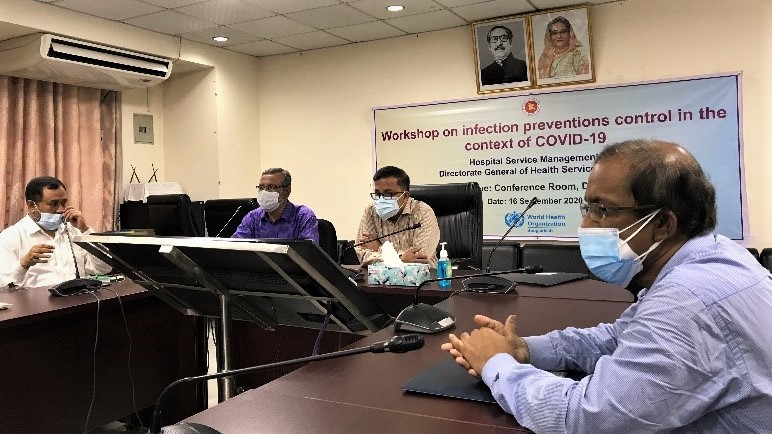The COVID-19 pandemic has unveiled the huge challenges and risks health workers are facing globally including health care-associated infections, violence, stigma, psychological and emotional disturbances, illness, and even death. Furthermore, working in stressful environments makes health workers more prone to errors which can lead to patient harm.
Worldwide 134 million adverse events occur each year due to unsafe care in hospitals in low- and middle-income countries, contributing to 2.6 million deaths annually out of which many can be avoided.
Acknowledging the importance of health workers safety to keep patients safe and the role of Infection Prevention and Control (IPC) in this process, Bangladesh marked World Patient Safety Day by bringing together health specialist from academia, public and private health sectors, and policy-makers to further advance in strengthening IPC in health facilities.
Two workshops have been organized on 16 and 17 September in Dhaka by the Directorate General of Health Services (DGHS) with WHO’s support aimed to update current information and guidelines for health managers and physicians as well as to assess challenges and opportunities for scaling up IPC practices in the context of coronavirus infections.

“Before COVID-19 there was a gap of awareness and practice of IPC in the health facilities. However, since the start of the pandemic, a large number of trainings and awareness activities have been conducted and we are now in a phase where the situation has improved. However, additional work must be done on the pathway of training our health workers and to translate the knowledge into action.” said Dr. Md Khurshid Alam, Line Director, Hospital Services Management.
Due to COVID-19, IPC measures became an essential part of clinical services. While the awareness greatly increased, the pandemic also led to the implementation in health facilities of better IPC protocols and guidelines together with scaled up monitoring activities.
However, participants in the workshops identified also challenges in implementing efficient IPC actions in health facilities such as general overload of patients, shortage of cleaning staff, insufficient budget for IPC logistics, or gaps in waste disposal management, especially concerning Personal Protective Equipment.
In this regard WHO guides health authorities to implement effective IPC measures and assist the local hospitals management to adopt the standard practices in IPC through engaging health care providers that will improve the quality of care in the hospitals.
“WHO supports the Government and health partners to further build on the work conducted to strengthen IPC, to elaborate, implement and enforce IPC standards and strategies at national and facility levels, for the safety of health workers and the patients.” Said Dr. Murad Sultan, WHO National Professional Officer Health Service Delivery.
While in most countries health workers represent less than 3% of the population and less than 2% in almost all low- and middle-income countries, around 14% of COVID-19 cases reported to WHO are among health workers. In some countries, the proportion can be as high as 35%.
In addition to physical risks, the pandemic has placed extraordinary levels of psychological stress on health workers exposed to high-demand settings for long hours, living in constant fear of disease exposure while separated from family and facing social stigmatization.
On World Patient Safety Day, WHO stands beside the Government of Bangladesh in ensuring the health, safety, and wellbeing of health workers, both during outbreak events and at all other times.
